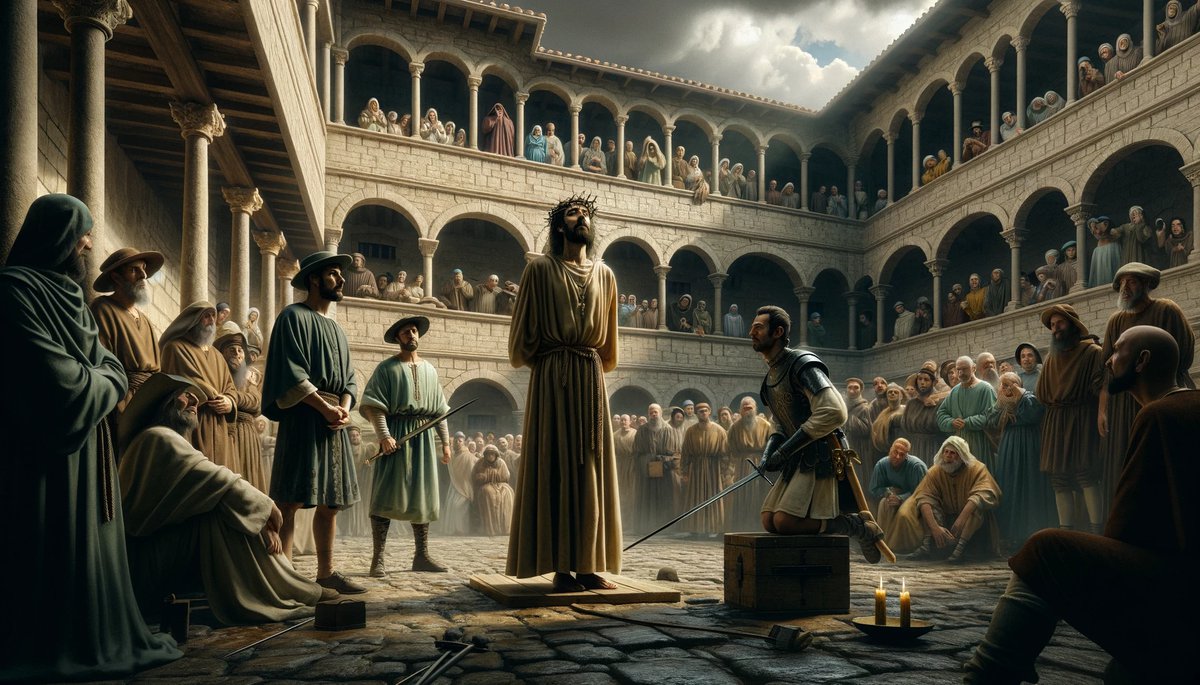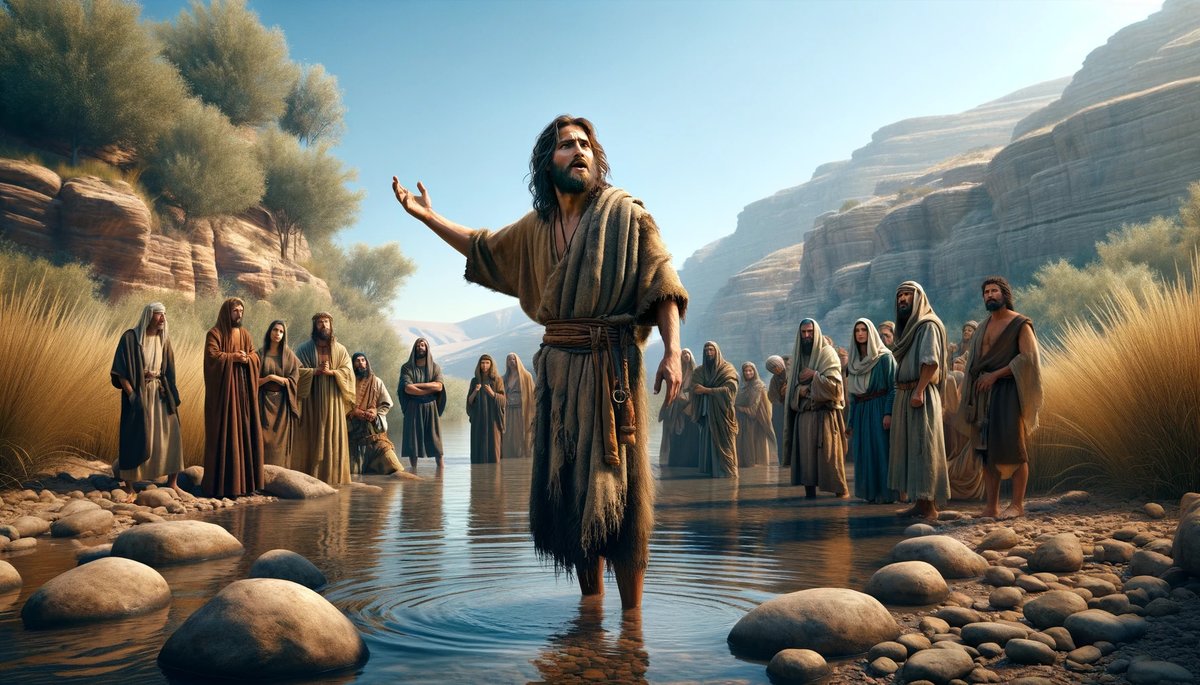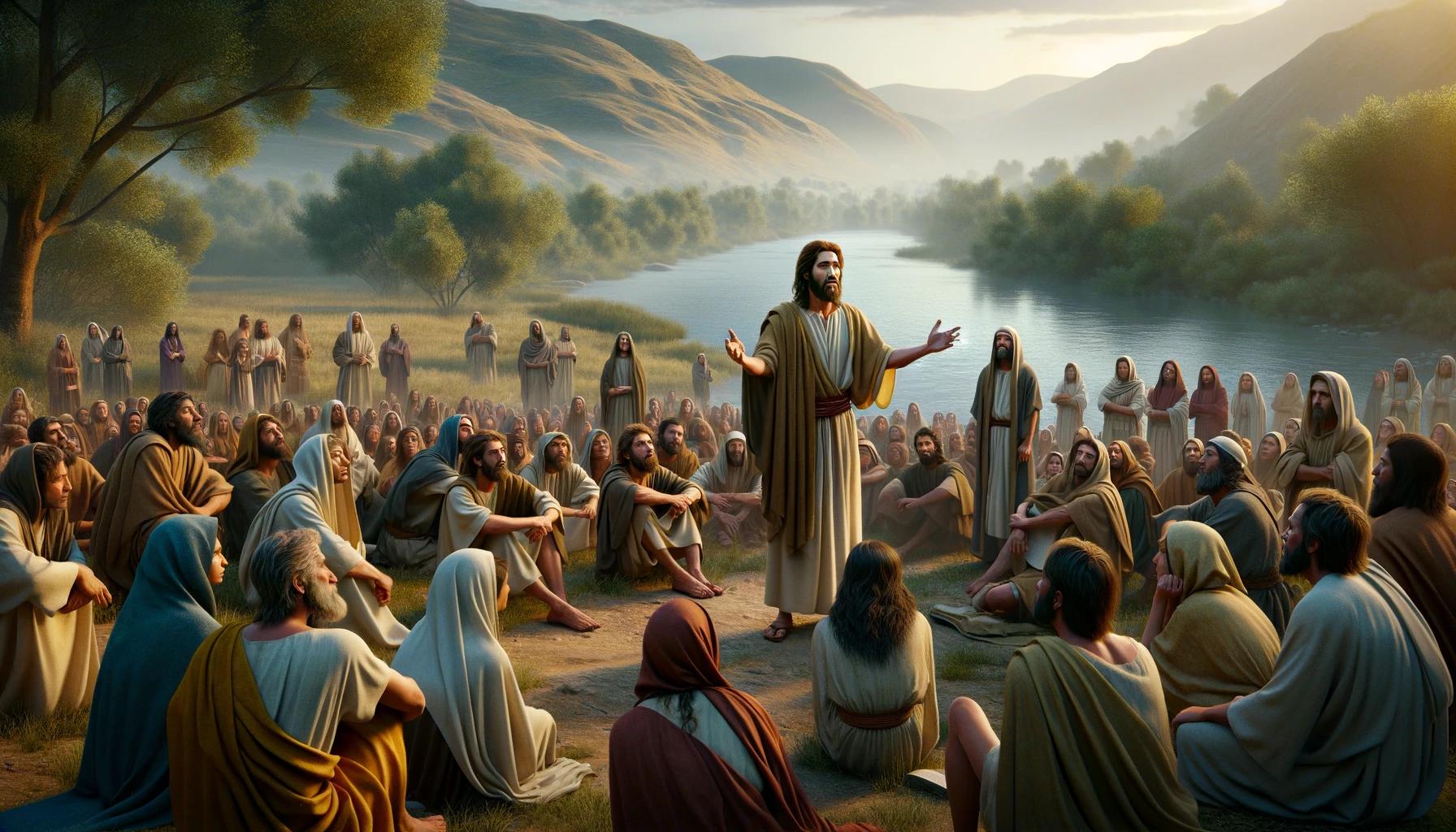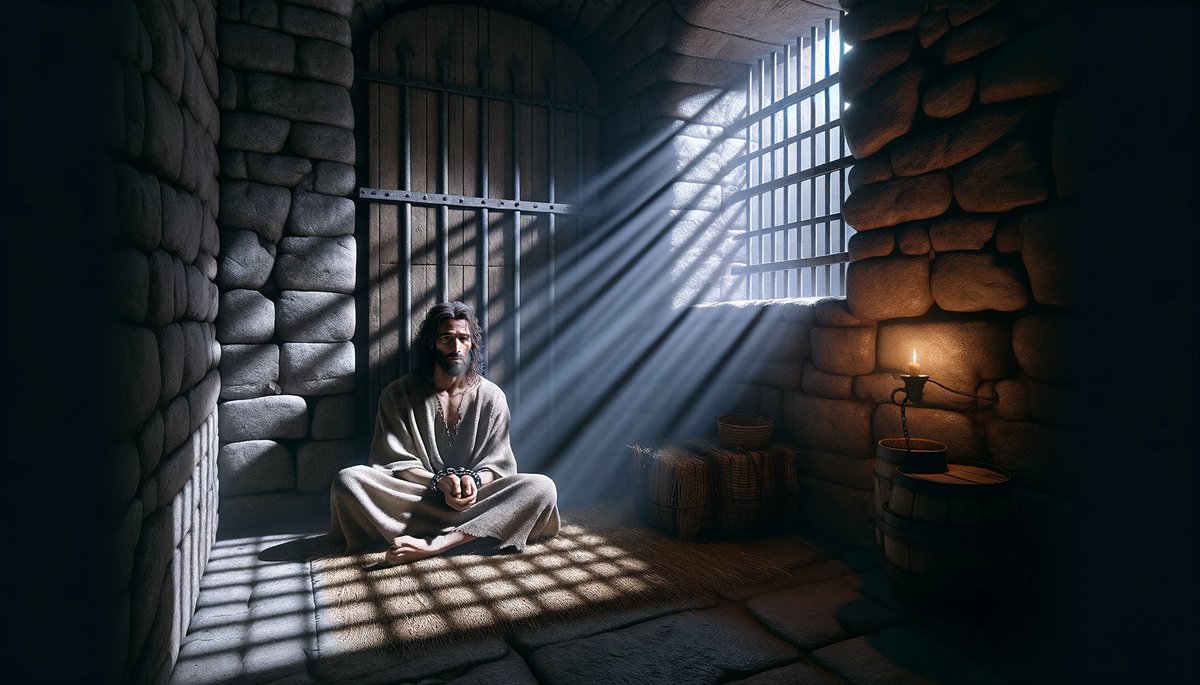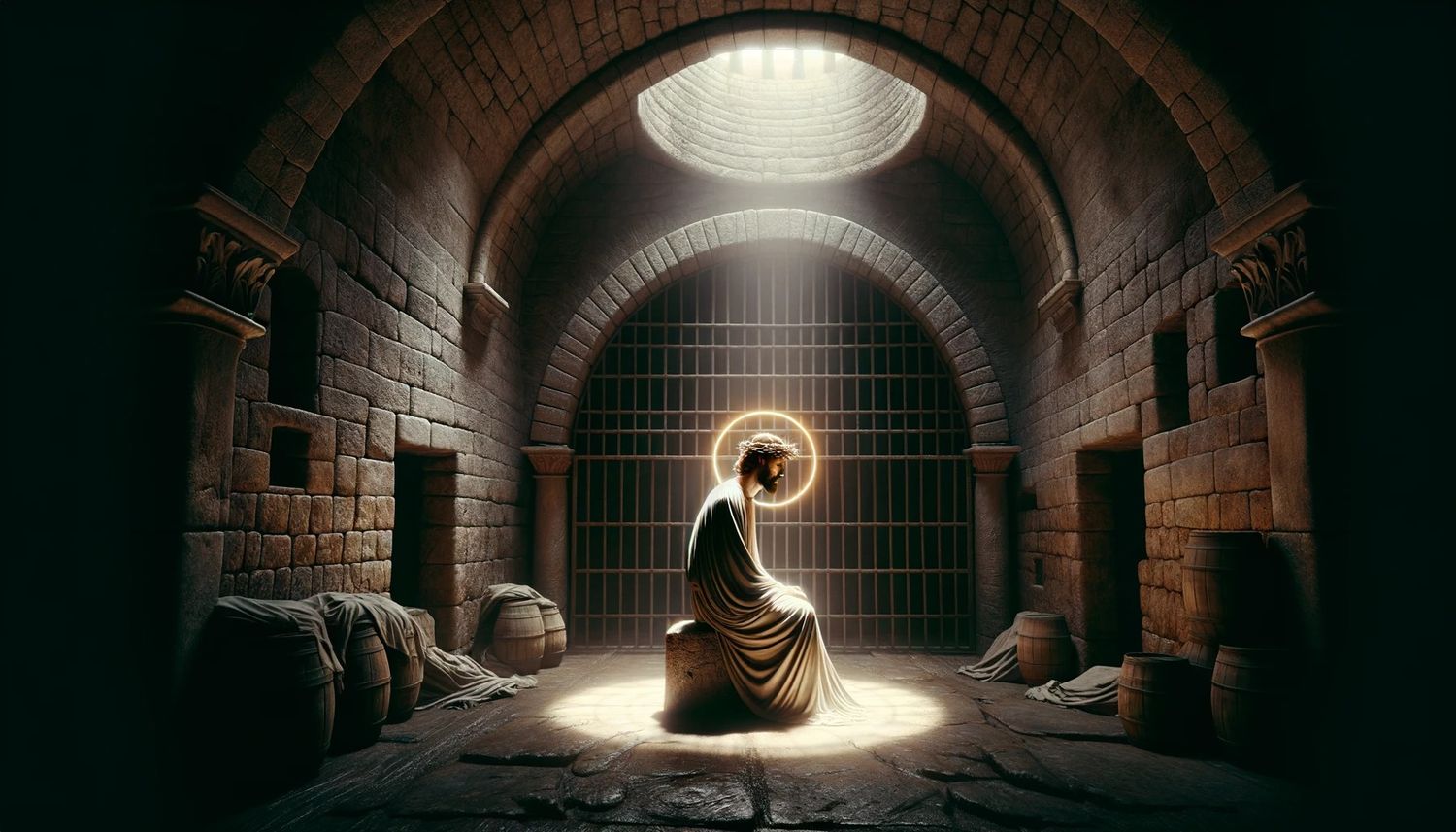Home>Theology and Spirituality>When Did John The Baptist Live


Theology and Spirituality
When Did John The Baptist Live
Published: February 24, 2024
Peter Smith, Editorial Director at Christian.net, combines deep insights into faith, politics, and culture to lead content creation that resonates widely. Awarded for his contributions to religious discourse, he previously headed a major organization for religious communicators, enhancing dialogue on faith's societal impacts.
Discover the timeline of John the Baptist's life and his significance in theology and spirituality. Explore his impact on religious history and beliefs.
(Many of the links in this article redirect to a specific reviewed product. Your purchase of these products through affiliate links helps to generate commission for Christian.net, at no extra cost. Learn more)
Table of Contents
Introduction
The life and legacy of John the Baptist have left an indelible mark on the history of spirituality and religion. As a pivotal figure in Christian and Islamic traditions, John the Baptist is revered for his unwavering commitment to his divine calling and his profound influence on the lives of those around him. His story is one of courage, conviction, and spiritual awakening, making it a timeless source of inspiration for people of faith across the globe.
In this comprehensive exploration, we will delve into the historical context, birth, early life, ministry, and ultimately, the death of John the Baptist. By unraveling the intricacies of his life and the impact of his teachings, we aim to gain a deeper understanding of the profound significance of his existence and the enduring lessons he imparts to humanity. Through this journey, we will uncover the timeless wisdom embedded within the narrative of John the Baptist, shedding light on the spiritual truths that continue to resonate with believers and seekers of truth.
Join us as we embark on a captivating odyssey through the life and times of John the Baptist, a remarkable figure whose influence transcends the boundaries of time and space, leaving an indelible imprint on the tapestry of human history.
Read more: When Did Jesus And John The Baptist Meet
The Historical Context of John the Baptist
John the Baptist emerged onto the stage of history during a tumultuous period in ancient Judea. His life unfolded against the backdrop of a society grappling with political upheaval, religious fervor, and the yearning for spiritual renewal. The first century was a time of profound significance, marked by the interplay of various cultural, religious, and political forces that shaped the destiny of the region.
At the time of John the Baptist, Judea was under Roman rule, and the people endured the heavy burden of foreign domination. This occupation fueled widespread discontent and resistance among the populace, setting the stage for social unrest and political agitation. Amidst this climate of turmoil, religious movements and messianic expectations flourished, as the Jewish people fervently anticipated the arrival of a deliverer who would liberate them from oppression and restore their autonomy.
In the midst of this charged atmosphere, John the Baptist emerged as a prophetic voice, calling the people to repentance and spiritual renewal. His message reverberated with echoes of the ancient prophets, urging the people to turn away from their transgressions and prepare for the imminent arrival of a transformative figure. John's proclamation of a coming Messiah resonated deeply with the collective yearning for liberation and redemption that permeated the hearts of the Jewish populace.
Furthermore, the religious landscape of Judea during John's time was characterized by a diverse tapestry of beliefs and practices. The influence of Hellenistic culture, the presence of various Jewish sects such as the Pharisees, Sadducees, and Essenes, and the enduring legacy of the prophetic tradition all contributed to the rich mosaic of spiritual expression in the region. Against this backdrop, John the Baptist's ascetic lifestyle and uncompromising message stood out as a powerful testament to his unwavering commitment to his divine calling.
In essence, the historical context of John the Baptist's life provides a compelling lens through which to understand the complexities of the era in which he lived. His emergence as a prophetic figure, his message of repentance and spiritual preparation, and the socio-political dynamics of his time all converge to paint a vivid portrait of a pivotal period in history. It is within this intricate tapestry of historical forces and spiritual expectations that the timeless significance of John the Baptist's life and ministry unfolds, leaving an indelible mark on the annals of human history.
The Birth and Early Life of John the Baptist
The birth and early life of John the Baptist are shrouded in divine significance and miraculous occurrences. According to the Gospel of Luke, John's parents, Zechariah and Elizabeth, were righteous and devout individuals who had longed for a child but were unable to conceive due to Elizabeth's barrenness. However, their lives were forever transformed when the angel Gabriel appeared to Zechariah, announcing that Elizabeth would bear a son who would be named John. This divine proclamation was met with incredulity by Zechariah, who was subsequently struck mute until the fulfillment of the angel's words.
The miraculous conception of John the Baptist, despite Elizabeth's advanced age and barrenness, serves as a testament to the divine intervention that heralded his arrival. His birth was a cause for great rejoicing, as it signified the fulfillment of God's promise and the dawning of a new era. The naming of John, as instructed by the angel, was a departure from tradition and carried profound symbolic significance, as it signaled the beginning of a transformative chapter in the history of salvation.
John's upbringing was marked by a sense of divine purpose and calling. As he matured, he retreated to the wilderness, where he embraced an ascetic lifestyle, devoting himself to prayer, meditation, and spiritual contemplation. This period of solitude and introspection prepared him for the extraordinary role he was destined to fulfill, laying the foundation for his prophetic ministry and his unwavering commitment to his divine calling.
The early life of John the Baptist is characterized by a sense of divine ordination and purpose, as his miraculous birth and formative years in the wilderness set the stage for the profound impact he would have on the spiritual landscape of his time. His upbringing in the wilderness, steeped in prayer and contemplation, cultivated the spiritual fortitude and unwavering conviction that would define his prophetic ministry. This formative period not only shaped John's character but also imbued him with the spiritual insight and moral clarity that would resonate with multitudes, drawing them to the banks of the Jordan River to heed his transformative message of repentance and spiritual renewal.
In essence, the birth and early life of John the Baptist are imbued with divine significance, encapsulating the miraculous and transformative nature of his existence. From his miraculous conception to his formative years in the wilderness, every aspect of John's early life foreshadowed the extraordinary role he would play in heralding the advent of the Messiah and calling humanity to embrace a path of spiritual awakening and renewal.
The Ministry of John the Baptist
The ministry of John the Baptist stands as a testament to his unwavering commitment to his divine calling and his profound impact on the spiritual landscape of his time. Emerging from the wilderness, John embarked on a transformative mission, compelling people to confront their spiritual complacency and embrace a path of repentance and renewal. His ministry unfolded along the banks of the Jordan River, where he baptized multitudes, symbolizing their cleansing from sin and their readiness to embrace a new way of life.
Central to John's ministry was his proclamation of the imminent arrival of the Messiah, the long-awaited deliverer whose coming would usher in a new era of spiritual fulfillment and redemption. His fervent exhortations and uncompromising message resonated deeply with the hearts of those who sought spiritual truth and yearned for a deeper connection with the divine. People from all walks of life flocked to hear John's powerful sermons, drawn by the authenticity and urgency of his call to repentance.
Moreover, John's ministry was characterized by a radical reorientation of traditional religious paradigms. He fearlessly challenged the religious authorities of his time, denouncing hypocrisy and calling for genuine transformation of the heart. His confrontations with the Pharisees and Sadducees underscored his unwavering commitment to truth and righteousness, as he called upon them to demonstrate the authenticity of their faith through genuine acts of compassion and justice.
Furthermore, John's baptismal rites symbolized a profound spiritual rebirth, inviting individuals to embrace a renewed relationship with the divine and a commitment to righteous living. The act of baptism served as a powerful symbol of purification and spiritual readiness, marking a decisive break from the past and a conscious embrace of a transformed way of being.
In essence, the ministry of John the Baptist embodied a radical call to spiritual awakening and moral renewal, challenging individuals to confront their innermost selves and embrace a path of righteousness and authenticity. His unwavering dedication to his divine mission and his transformative impact on the lives of those who encountered him underscore the enduring significance of his ministry, serving as a timeless beacon of hope and inspiration for generations to come.
The Death of John the Baptist
The death of John the Baptist stands as a poignant and tragic chapter in the narrative of his extraordinary life. His unwavering commitment to truth and righteousness ultimately led to his martyrdom, cementing his legacy as a fearless prophet who remained steadfast in his convictions until the very end.
The circumstances surrounding John's death are recounted in the Gospels, shedding light on the events that precipitated this profound loss. Herod Antipas, the tetrarch of Galilee and Perea, found himself embroiled in a tumultuous political and moral dilemma. Herod had unlawfully taken Herodias, his brother Philip's wife, as his own, a union that contravened Jewish law and moral principles. John the Baptist fearlessly condemned this illicit relationship, denouncing Herod's actions and calling for repentance.
Herodias, resentful of John's outspoken condemnation, harbored a deep-seated animosity towards him. The opportunity for retribution presented itself during a lavish banquet held in Herod's court, where Herodias' daughter, Salome, captivated the assembled guests with her dancing. In a fateful turn of events, Herod, swayed by Salome's performance, made a rash vow to grant her any request, up to half his kingdom. Prompted by her vengeful mother, Salome demanded the head of John the Baptist on a platter.
Herod, torn between his fear of the people, his regard for John, and his ill-fated oath, succumbed to the demands of Herodias and ordered the execution of John. The beheading of John the Baptist in prison marked the tragic culmination of his unwavering commitment to truth and righteousness, as well as the price he paid for fearlessly confronting moral corruption and injustice.
The death of John the Baptist reverberated across the land, evoking profound sorrow and indignation among his followers and all who had been touched by his transformative message. His martyrdom served as a stark reminder of the perils faced by those who dare to challenge the status quo and uphold the principles of justice and righteousness.
In the wake of John's death, his disciples and followers continued to uphold his legacy, ensuring that his teachings and unwavering commitment to truth would endure. The profound impact of John's life and the circumstances surrounding his death serve as a timeless testament to the enduring power of moral courage and the indelible mark left by those who fearlessly champion the cause of righteousness.
The death of John the Baptist stands as a poignant reminder of the profound sacrifices made by those who uphold truth and justice, inspiring generations to embrace the mantle of moral courage and unwavering commitment to righteousness.
Read more: When Did John The Baptist And Jesus Meet
Conclusion
The life and legacy of John the Baptist resonate with timeless significance, transcending the boundaries of history to impart enduring wisdom and inspiration. His emergence onto the stage of history during a tumultuous period in ancient Judea, his miraculous birth and formative years in the wilderness, his transformative ministry along the banks of the Jordan River, and his tragic martyrdom all converge to form a narrative of profound spiritual significance.
John the Baptist's unwavering commitment to his divine calling, his fearless proclamation of repentance and spiritual renewal, and his resolute stand for truth and righteousness serve as a timeless beacon of hope and inspiration. His life embodies the transformative power of moral courage and the enduring impact of those who fearlessly champion the cause of justice and righteousness.
Furthermore, the historical context of John the Baptist's life provides a compelling lens through which to understand the complexities of the era in which he lived. His emergence as a prophetic figure, his message of repentance and spiritual preparation, and the socio-political dynamics of his time all converge to paint a vivid portrait of a pivotal period in history.
The birth and early life of John the Baptist are imbued with divine significance, encapsulating the miraculous and transformative nature of his existence. From his miraculous conception to his formative years in the wilderness, every aspect of John's early life foreshadowed the extraordinary role he would play in heralding the advent of the Messiah and calling humanity to embrace a path of spiritual awakening and renewal.
John the Baptist's ministry embodied a radical call to spiritual awakening and moral renewal, challenging individuals to confront their innermost selves and embrace a path of righteousness and authenticity. His unwavering dedication to his divine mission and his transformative impact on the lives of those who encountered him underscore the enduring significance of his ministry, serving as a timeless beacon of hope and inspiration for generations to come.
The death of John the Baptist stands as a poignant reminder of the profound sacrifices made by those who uphold truth and justice, inspiring generations to embrace the mantle of moral courage and unwavering commitment to righteousness. His martyrdom serves as a stark reminder of the perils faced by those who dare to challenge the status quo and uphold the principles of justice and righteousness.
In conclusion, the life and legacy of John the Baptist continue to resonate with profound significance, offering timeless lessons in courage, conviction, and unwavering commitment to truth. His story serves as a testament to the enduring power of moral courage and the transformative impact of those who fearlessly champion the cause of righteousness, leaving an indelible mark on the tapestry of human history.
